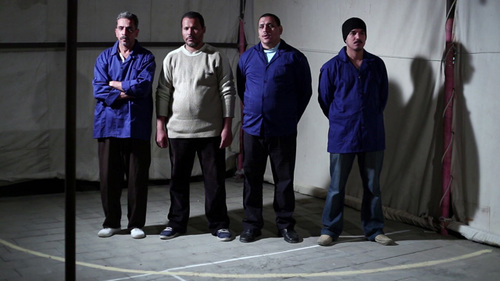Events/Research
10.03.2015
8:00pm
Stage Struggles
How to Act: On Stages and Storytellers
Mark Westmoreland, Jasmina Metwaly & Philip Rizk
Anthropologist and filmmaker Mark Westmoreland will be in conversation with the artist and filmmaker duo Jasmina Metwaly and Philip Rizk about the work of Peter Watkins. The filmmakers’ dialogue will feature excerpts of Peter Watkins’ “La Commune” and “The Universal Clock: The Resistance of Peter Watkins” (2001) by Geoff Bowie. “La Commune” will be screened in its entirety with Arabic and English subtitles on March 24th.
This event is part of “How to Act: On Stages and Storytellers”, the dénoumenet to Beirut’s three years of programming. “How to Act” follows a series of tangents departing from Metwaly’s and Rizk’s references, from classical cinematic works to the current practice of activists, artists, scholars and researchers, in Egypt and elsewhere.
Biographies
Mark Westmoreland is a professor of anthropology and a documentary filmmaker. His long-term research interest is to investigate the visual art practices in the wake of the Lebanese civil war. He explores the generative possibilities enabled by crossing disciplinary borders between anthropological and artistic modes of social inquiry.
Jasmina Metwaly is a visual artist and filmmaker based in Cairo, co-founder of the 8784 project and a founding member of Mosireen video collective. She studied painting in Poznań. She is interested in the points of intersection/division between single-channel image, video, and documentary filmmaking. Since January 2011 Metwaly has been involved with the No to Military Trials on Civilians campaign. Metwalyʼs work has been exhibited at international art venues and festivals including Townhouse Gallery, Cairo, Egypt (2010), Cairo Documenta (2010/2012), IFFR (2012), and Berlinale Forum Expanded (2014).
Philip Rizk, is a filmmaker and writer based in Cairo, Egypt. He studied Philosophy and Anthropology and has been working with video since 2009. His first film is the short documentary "This Palestinian Life” (2009). In 2010 Rizk completed the short film series “Sturm”, a two channel articulation that explores rural and industrial ruin in Egypt. Together with Jasmina Metwaly he formed the video collective intifadat intifadat in 2011, producing the series of videos "Remarking January 25". Since 2011 Rizk has been a member of the Mosireen video collective. Metwaly and Rizk's film "Land Without" is in long-term post-production. Rizk's text have appeared in various collected volumes, the Journal of Human Geography and on the sites jadaliyya.com and roarmag.org.
Film Synopsis
La Commune (2000)
345 min., French, Black and White
Noted filmmaker and media critic Peter Watkins directs this mammoth six-hour-long look at the legendary Paris Commune of 1871. Following the humiliating defeat of France in the Franco-Prussian War, the reign of Napoleon III collapsed in the resulting public foment. While a new regime headed under the Government of National Defense tried to shore up power, a band of commoners took the reigns of power for themselves and created the Paris Commune, a government defiantly separate from the state operating under a sort of proto-Marxist ethos. Inevitably, the Commune was brutally suppressed by French troops. Watkins' treatment of the event juxtaposes the present with the past -- modern day CNN-style reporting with historical fact. This film was screened at the 2001 Toronto Film Festival. The filming of ‘La Commune’ took place in July 1999, in an abandoned factory in Montreuil, on the eastern edge of Paris. The factory stands on the site of the former film studios of French film pioneer Georges Méliès (1861-1938).
